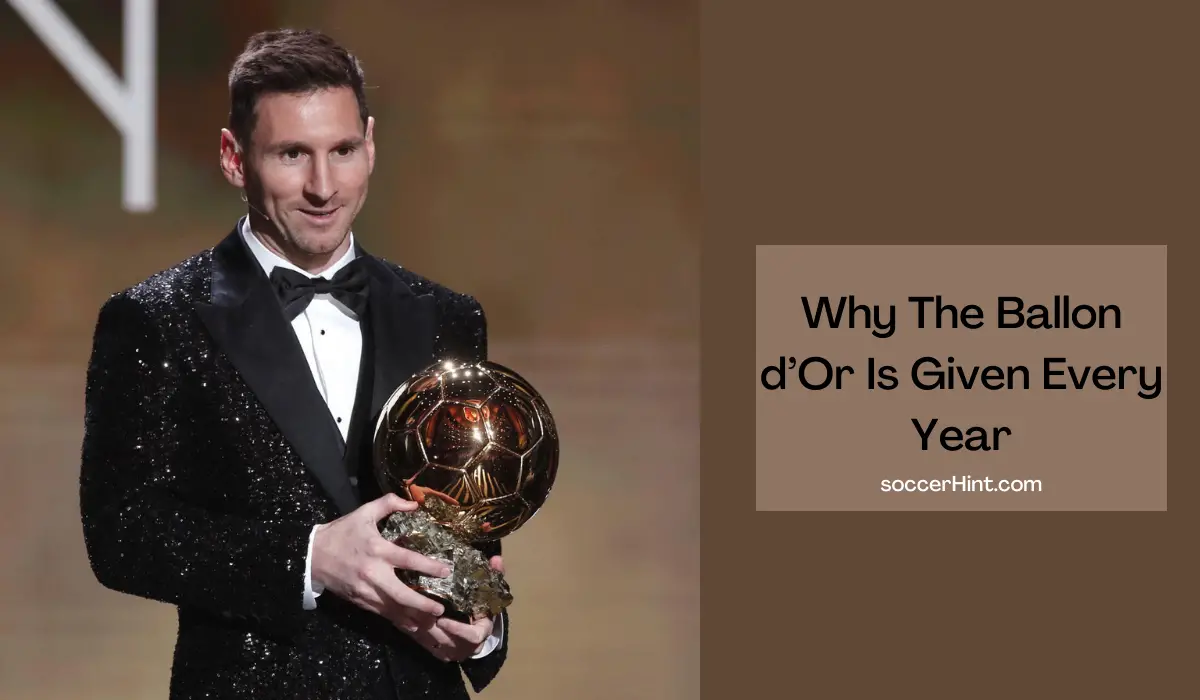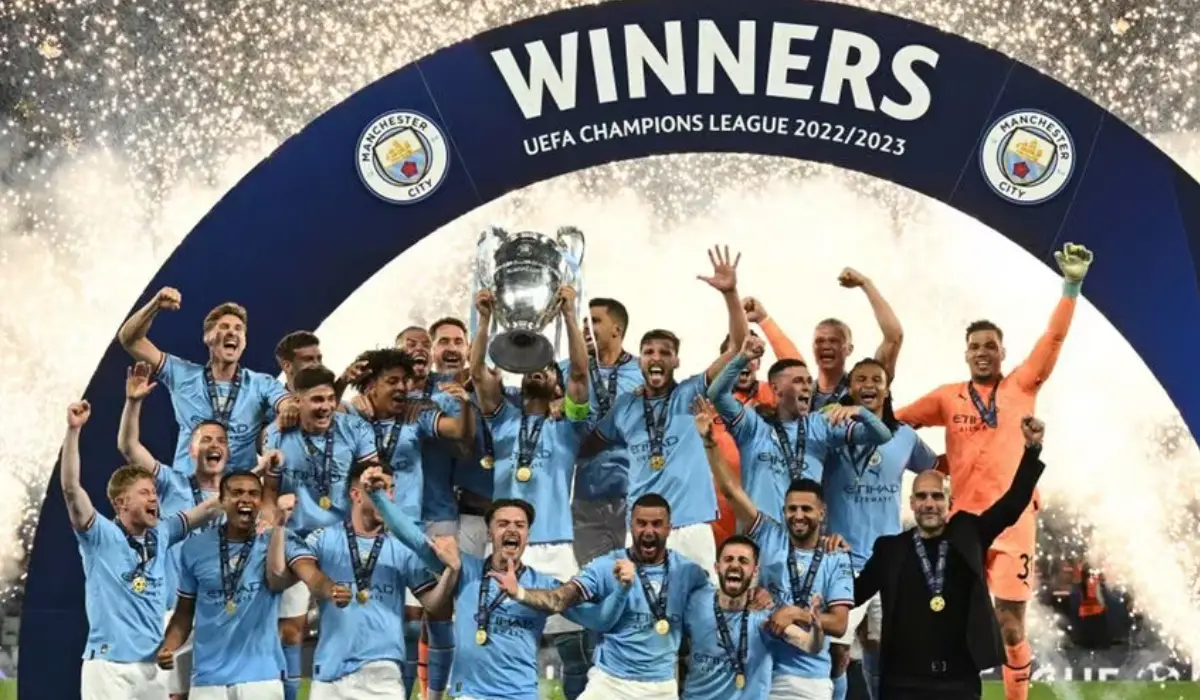Accolades and honours are as abundant as the goals scored on the pitch. From golden boots to golden gloves, there are countless awards recognizing the brilliance of players, managers, and teams in the beautiful game. Yet, amidst this galaxy of glittering distinctions, one accolade shines brighter and captivates football enthusiasts and players alike – the Ballon d’Or. But have you ever wondered why the Ballon d’Or is given? What makes this award, presented annually to the world’s best footballer, so special and coveted?
In this article, the rich history and significance of the Ballon d’Or will be discussed, unravelling the essence of why it is bestowed upon the chosen few in the realm of football excellence.
Read Also: 2021 Ballon d’Or Top 10 List
Brief History of the Ballon d’Or Award In Football
Looking into the history of the award may give us a bit of insight into why the Ballon d’Or is given.
The Ballon d’Or award, which translates to “Golden Ball” in English, has a rich and storied history dating back to the mid-20th century. See how the voting process for the award takes place.
Here’s a brief overview of its origins and development:
1956 – The Birth of Ballon d’Or
The Ballon d’Or was first introduced in 1956 by the French football magazine, “France Football.” It was created by editor Gabriel Hanot as a way to recognize the best European football player of the year. The inaugural award was won by Stanley Matthews, an English footballer renowned for his skill and longevity in the sport.
1957-1994 – Limited to European Players
For many years, the Ballon d’Or was exclusively awarded to European players who had showcased exceptional talent in European club competitions. This limitation was a reflection of the magazine’s European focus during that era.
1995 – Inclusion of Non-European Players
In 1995, the Ballon d’Or criteria expanded to include players from all around the world, not just those who competed in European leagues. George Weah, a Liberian striker, became the first non-European player to receive the award.
2010 – Merge with FIFA World Player of the Year
From 1995 to 2009, the Ballon d’Or and the FIFA World Player of the Year awards coexisted as separate honours. However, in 2010, they were merged into a single award known as the FIFA Ballon d’Or. This unified award recognized the best football player in the world, regardless of their geographic origin. During this period, the award was dominated by the rivalry between Lionel Messi and Cristiano Ronaldo, with both players winning multiple times.
2016 – Return to the Ballon d’Or
In 2016, the partnership between FIFA and France Football came to an end, and the award reverted to its original title, the Ballon d’Or. This move revived the historic tradition of the award, which continues to be presented annually to the world’s top footballer.
Throughout its history, the Ballon d’Or has served as a prestigious recognition of outstanding individual achievement in the world of football. It has celebrated the talents of legendary players such as Pelé, Diego Maradona, Michel Platini, Zinedine Zidane, and more recently, Lionel Messi and Cristiano Ronaldo, among others. The Ballon d’Or remains a coveted honour for footballers worldwide and a symbol of excellence in the sport.
5 Main Reasons Why Ballon d’Or Is Given
1. Recognizing Individual Excellence
The Ballon d’Or actualizes this point by placing a spotlight on the remarkable individual achievements of a football player. Unlike team awards that celebrate collective success, the Ballon d’Or acknowledges the outstanding contributions of an individual player to their team’s performance. It evaluates not only a player’s goal-scoring abilities but also their skills in dribbling, passing, creativity, and overall impact on the game. This focus on individual brilliance sets the Ballon d’Or apart from other awards, such as team-specific honours like the UEFA Champions League or FIFA World Cup, which prioritize collective achievement.
2. Highlighting Outstanding Performance in Football
The Ballon d’Or is a prestigious honour that underscores exceptional performance in football. It considers a player’s overall contributions throughout the year, taking into account both domestic and international competitions. This holistic evaluation distinguishes it from awards that may primarily focus on specific aspects of the game, like the Golden Boot for the top goal scorer. One additional reason why Ballon d’Or is given is that it recognizes the player who consistently delivers standout performances across various facets of the sport, making it a comprehensive indicator of footballing excellence.
3. Celebrating Exceptional Skill and Talent
The Ballon d’Or is synonymous with celebrating the extraordinary skills and talents of a player. It takes into account factors like dribbling, playmaking, defending, and versatility, offering a well-rounded assessment of a player’s abilities. In contrast, awards like the Golden Glove, which honours the best goalkeeper, or the Golden Boy, which recognizes young talent, have a narrower focus. The Ballon d’Or is unique in its ability to honour players from all positions and playing styles, emphasizing that football excellence extends beyond scoring goals.
4. Honoring the Best Player in the World
The Ballon d’Or is often regarded as the ultimate accolade for determining the best football player globally. While other awards like the FIFA Best Men’s Player and UEFA Men’s Player of the Year also aim to crown the top player, the Ballon d’Or’s history and prestige set it apart. It considers a player’s body of work over the entire year, making it a comprehensive measure of a player’s performance on a global scale. Winning the Ballon d’Or is a testament to a player’s status as the cream of the crop in the footballing world.
5. Showcasing Consistency and Achievement Over the Year
The Ballon d’Or stands out by recognizing sustained excellence and achievement over an entire calendar year. While other awards may focus on specific tournaments or timeframes, the Ballon d’Or considers a player’s performance from January to December. This extended evaluation period ensures that the winner consistently delivers exceptional performances throughout the year, making it distinct from awards that might only consider a single tournament or competition.
The Problem With Ballon d’Or
Promotion of Personal Interest in a Team Sport
The Ballon d’Or has faced criticism for seemingly promoting individualism in a sport that is fundamentally a team endeavour. Football, by its nature, relies on collective efforts, teamwork, and coordination to achieve success. However, the Ballon d’Or tends to focus on individual accomplishments, such as goals scored, assists made, and personal statistics. This can inadvertently place an excessive emphasis on personal achievements over the importance of teamwork and collaboration.
Fact: Historically, the Ballon d’Or has predominantly been awarded to attacking players, particularly forwards and midfielders. These players often have more opportunities to score goals and create highlights that capture the attention of voters and fans. For instance, as of my knowledge cutoff date in September 2021, the Ballon d’Or has been won by a forward or attacking midfielder in the majority of cases, with defenders and goalkeepers rarely receiving the honour.
Bias Towards Attacking Players
Another issue associated with the Ballon d’Or is its perceived bias towards attacking players, which can lead to the underappreciation of defenders. Defenders play a vital role in a team’s success by preventing goals and providing a solid defensive foundation. However, their contributions, which often involve less visibility and fewer statistical milestones than those of attacking players, may go unnoticed when it comes to awarding the Ballon d’Or.
Fact: Historically, the Ballon d’Or has shown a clear preference for attacking players. For instance, the last time a defender won the award was in 2006 when Fabio Cannavaro was honoured. Before that, it was the legendary Franz Beckenbauer in 1972. This stark contrast to the frequency of forwards and midfielders winning the award highlights the bias towards players involved in goal-scoring actions.
Final Thoughts
The Ballon d’Or, despite its associated challenges and historical biases, remains the most prestigious individual honour in football. Its main essence lies in recognizing and celebrating exceptional individual talent and performance in a sport that thrives on teamwork and collective effort.
While the award has faced criticism for promoting personal interest and favouring attacking players, its history and significance cannot be understated.
Overall, the award continues to captivate players and fans alike, serving as a symbol of football excellence and a coveted achievement for those who grace the pitch.
Despite the challenges and criticisms it faces, the Ballon d’Or continues to be a coveted honour, answering the question of why the Ballon d’Or is given by shining a spotlight on the brightest stars in the footballing galaxy.





